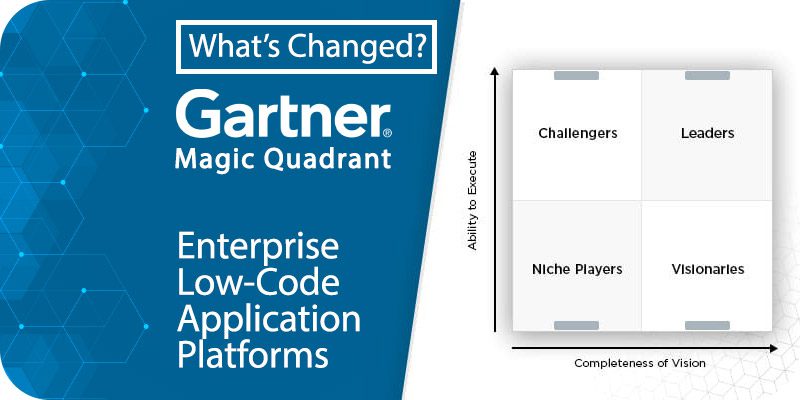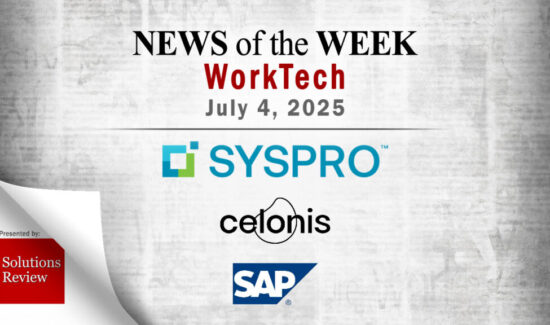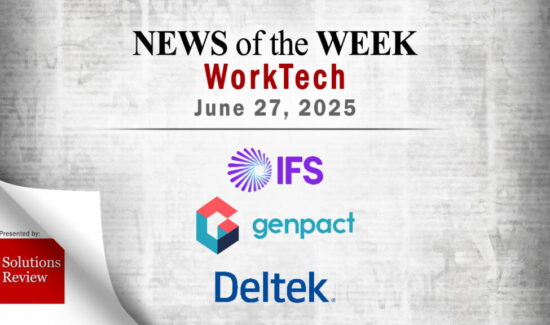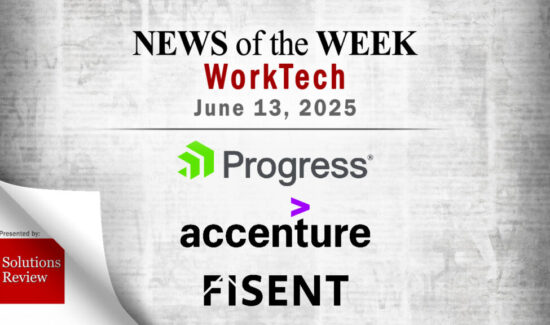What’s Changed: 2023 Gartner Magic Quadrant for Enterprise Low-Code Application Platforms


The editors at Solutions Review highlight the key takeaways from the 2023 Magic Quadrant for Enterprise Low-Code Application Platforms (LCAPs) and analyze the report.
Analyst house Gartner, Inc. recently released the 2023 edition of its Magic Quadrant for Enterprise Low-Code Application Platforms. According to Gartner, an LCAP “provides rapid application development and deployment using low-code and no-code techniques such as declarative, model-driven application design and development together with the simplified one-button application deployment of applications.”
To qualify for Gartner’s report, each LCAP vendor had to demonstrate a go-to-market strategy with specific pricing for its low-code application platform, support the development and deployment of applications, provide an LCAP offering with both no-code and low-code capabilities, have at least 20 percent year-over-year growth in revenue for the previous year, have direct customers in at least three specific geographies, and more. Vendors must also provide an LCAP that equips enterprise-class projects with high availability, disaster recovery, secure access to applications, technical support to customers, and third-party application access to application logic or data, via APIs or event topics.
What’s Changed: 2023 Gartner Magic Quadrant for Enterprise Low-Code Application Platforms
In this updated Magic Quadrant, Gartner analysts Paul Vincent, Kimihiko Iijima, Adrian Leow, Mike West, and Oleksandr Matvitskyy identified 17 of the most significant enterprise low-code application platform providers in the marketplace. The researchers behind the report evaluated the strengths and weaknesses of each provider listed. They ranked them on the signature “Magic Quadrant” graph, which provides readers with an illustration of each vendor’s ability to execute their vision. The diagram includes four quadrants: leaders, challengers, niche players, and visionaries.
Gartner adjusts the criteria it uses to evaluate providers to reflect changing trends in the market, which means the 2023 edition of the Magic Quadrant for Enterprise Low-Code Application Platforms looks different from prior reports. For example, Gartner updated its business and go-to-market inclusion criteria for the 2023 report to reflect buyer expectations and market trends. As a result, Alibaba, Huawei, Retool, Unqork, and Zoho were added to the report.
A breakdown of each category and the companies associated with it is below.
Leaders
Mendix is the highest-ranked Leader in this Magic Quadrant. According to Gartner, the company’s market differentiation is based on its support for citizen and professional developers, its library of composable assets for various business verticals, and its targeting independent software vendors (ISVs). Other strengths include the platform’s advanced enterprise low-code capabilities, flexible deployment options, multi-cloud support, a release strategy with backward compatibility, and its support for fusion teams via different editors.
OutSystems is a category leader thanks to its “evolutionary approach” to software engineering, enterprise-level platform features, platform extensibility, AI-augmented development capabilities, robust security tools, multi-experience development, and more. Other strengths include its customer success program, top-down and bottom-up engagement initiatives, and tools for the rapid growth of enterprise-grade applications. Gartner also identifies its application testing, enterprise agile planning, governance, and continuous integration/continuous delivery (CI/CD) capabilities as differentiating features.
Microsoft’s LCAP offering is Microsoft Power Apps, a suite that includes Power Automate, Power Pages (previously Power Apps portals), and the Dataverse data service. Its most significant strengths include its product strategy, API-driven development, and the platform extensibility it offers via AppSource, a publicly available app and component store for Microsoft. Gartner also spotlights Microsoft for its various connectors between Power Apps and its other products, like Microsoft 365.
ServiceNow’s LCAP product is the App Engine. Its market differentiation is based on the capabilities that power its SaaS offerings, fusion team collaboration tools, business processes, workflows, and case management. Gartner Peer Insights reported that ServiceNow has seen increased satisfaction and continues to grow its staff and geographic coverage. Other notable strengths include its sales execution—which has resulted in high business growth—and its market responsiveness, as indicated by the 3,000 apps ServiceNow has added to its ecosystem.
Salesforce rounds out the category with the Salesforce Platform, an LCAP offering that includes low-code and conventional development tooling capabilities, ranging from no-code visual builders to IDEs for scripting and 3GL scripting. Its strengths come from its extensive industry expertise, market responsiveness, consistent product updates, and extensive platform ecosystem via the Salesforce Marketplace (AppExchange), which includes 7,000+ resources for customers.
Challengers
Oracle is the first (and only) vendor listed as a Challenger in Gartner’s report. Its LCAP solution, Oracle APEX, is part of the Oracle Database suite and is available as a database feature or as the APEX service on Oracle Cloud. Its market differentiation is defined by its expression language, low entry costs, use of Oracle Autonomous Database for scalability, and high availability in the cloud and on-premises. Other strengths include its geographic presence across 37 regions, pricing model, sales execution strategy, and track record in revenue retention, growth, and profitability.
Visionaries
Appian is the first Visionary identified in Gartner’s report. Its LCAP offering’s market differentiation is based on its design studio toolkits and full-stack, low-code automation capabilities. Its strengths include its security certifications, multi-region high availability, Fedramp compliance, data encryption functionalities, extensive automation capabilities, and partner-driven ecosystem, which includes over 700 listings for solutions, connectors, functions, task automations, and other utilities.
The Zoho Creator Platform is the next LCAP named in the report. The platform is notable for its suite of cloud-native capabilities, including its unified analytics and process analysis tools. One of its main strengths is its maturity in the marketplace, which helps it support diverse developer personas, low-code application development languages, graphical process, data, and UI designer tools. Zoho Creator Platform supports Java, JavaScript, XPath, and Node.js.
Pega closes out the category with its Pega Infinity platform, equipped with business process automation, CRM, multi-experience development, and robotic process automation (RPA) for enterprise workflows. Gartner identifies its market differentiation as stemming from its suite of automation technologies for process optimization, different experiences for citizen and professional developers, and its digital experience APIs for B2C user interfaces.
Niche Players
Unqork kicks off the Niche Player category with its no-code, single-tenant architecture of solutions delivered via declarative assertions in a drag-and-drop interface. Its strengths as an LCAP vendor include its innovative product roadmap, the funding momentum it’s received over the last couple of years, and its productivity tools, which equip users with ease of use and time to market that developers look for in the platforms they use.
Huawei’s LCAP solution, Astro, is notable in the marketplace for its no-code approach to information-based applications developed by citizen developers. With Astro, users can utilize a low-code, model-driven system for workflow management and other complex applications. Gartner identifies Huawei’s platform ecosystem, sales execution strategies, and competitive product strategy as its differentiating strengths in the LCAP marketplace.
Creatio’s LCAP solution, Studio Creatio, equips enterprises with the capabilities to build, manage, optimize, and automate workflows across teams. Its market differentiations are based on workflow automation and no-code functionalities designed to augment Creatio’s CRM SaaS offering. Other strengths highlighted in the Magic Quadrant include its persuasive marketing strategy, single-environment approach for application developers, and customer care program, which supports customer success with various training and advisory services.
Alibaba is one of the new vendors added to this year’s Magic Quadrant report. Its LCAP offering, the YiDa platform, differentiates itself with a no-code approach to developing forms, integrations, reports, processes, and portal display pages. Strengths include its viability to paying and non-paying customers alike, its platform extensibility, and its straightforward drag-and-drop, data recording, and process auditing functionalities.
Retool provides professional developers with a low-code platform that offers drag-and-drop app building with tools that use HTML, JavaScript, CSS, and SQL. Notable features of Retool’s LCAP offering include its extensive viability for paying and non-paying customers, its user experience design, and its marketing strategy, which targets professional developers, a market traditionally known for its lack of awareness in LCAP.
Newgen’s LCAP solution is the NewgenONE Digital Transformation Platform, which uses a modern microservices-based architecture and artificial intelligence/machine learning (AI/ML) to develop business applications with content management and process automation capabilities. Gartner highlights Newgen’s business logic and workflow capabilities as notable strengths. Newgen is also well-regarded for its flexible licensing options and high customer satisfaction.
Kintone earns its place on Gartner’s Magic Quadrant for its no-code approach, collaboration features, and extensive partner ecosystem, which offers customers a range of extensions and plug-ins. The company is notable for its positive customer experience ratings on Gartner Peer Insights, healthy partner ecosystem, robust user support community, pricing models, and sales execution strategy.
Quickbase rounds out the 2023 Magic Quadrant with a no-code platform that prioritizes business technologists and citizen developers. Its strengths include its targeted customer experience, specialized business model, and product offering tailored to the specific use cases that citizen developers and business technologists encounter.




















